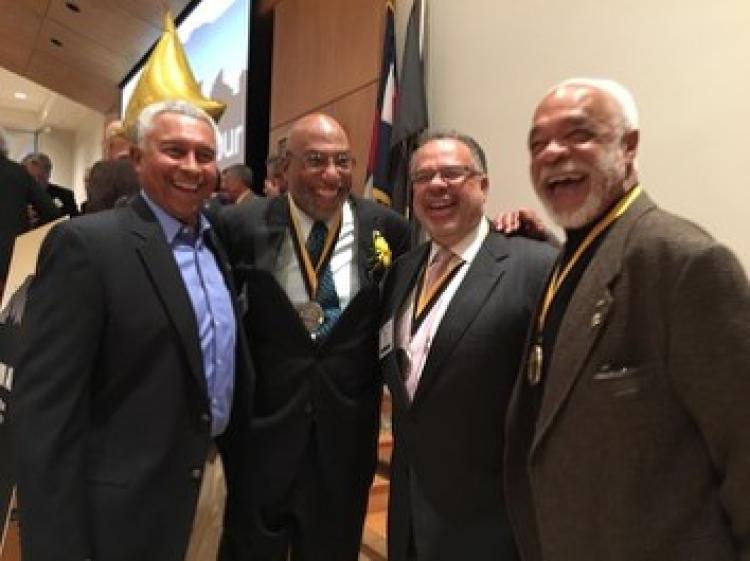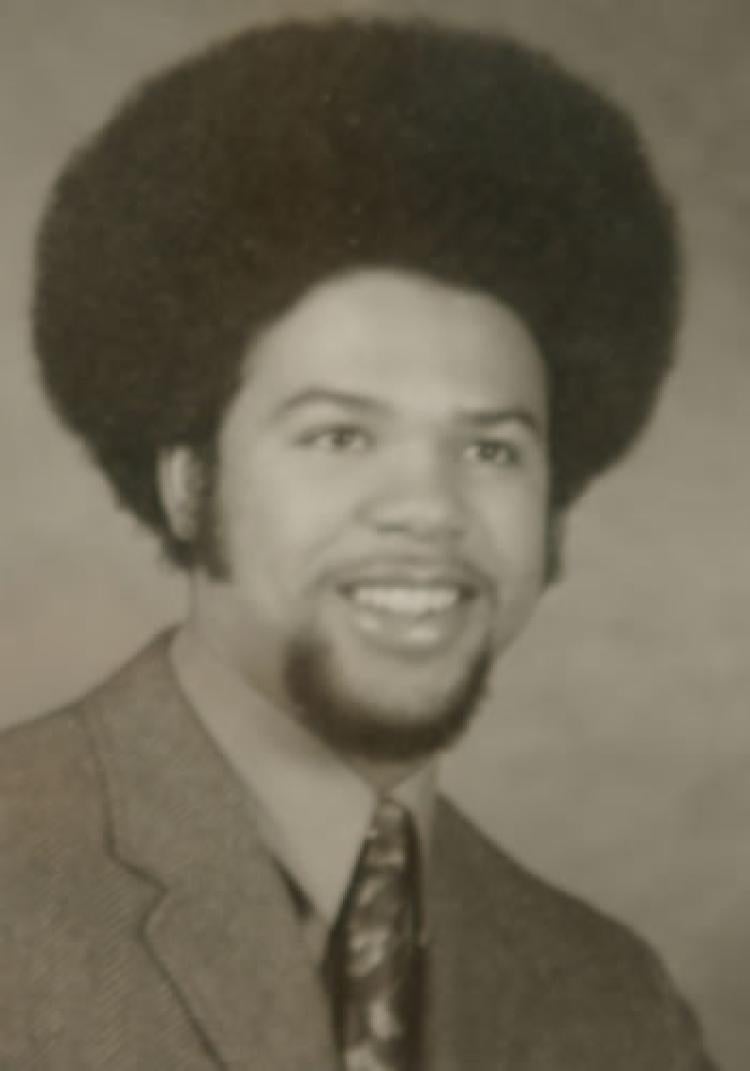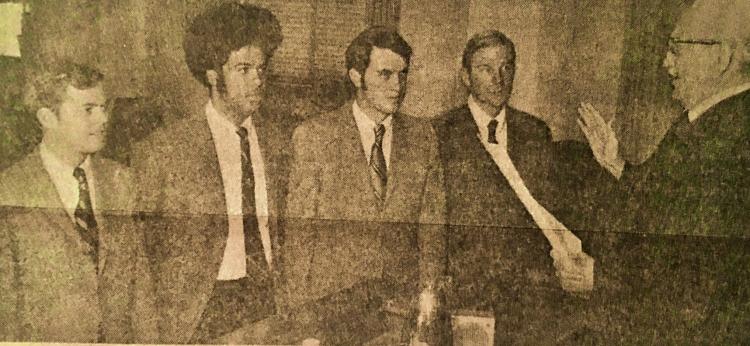Hon. Jackson (’70) Speaks on Moral Courage at Martin Luther King Jr. Day Celebration

At a Martin Luther King Jr. Day celebration held at CU Boulder on Jan. 21, Denver County Court Judge Gary Jackson (’70) delivered an inspiring message of moral courage and reflected on his experience growing up African American in Colorado.
The event, "Remembering His Life, Renewing His Legacy," was sponsored by CU Boulder’s Office of Diversity, Equity and Community Engagement; St. Aidan's Episcopal Church; the Lutheran Campus Ministry; CU Boulder Hillel; the Center for Western Civilization, Thought & Policy, and the city of Boulder Housing and Human Services.
On Feb. 25, Jackson will participate in a panel discussion at Colorado Law moderated by Associate Professor Anna Spain Bradley. Jackson, along with fellow panelists Sonny Flowers ('71), attorney with Hurth, Sisk & Blakemore, LLP, and Colorado Supreme Court Justice Monica Márquez, will discuss the topic of “Lawyers and Judges of Color Balance the Scales.” Learn more.
Jackson's remarks are as follows.
A Legacy of Courage
Thank you for the honor of speaking at this Dr. Martin Luther King, Jr. Day celebration. This is a gathering of my CU Buffalo friends, students, and members of the Boulder community. It is a special day for me to be invited by the faith communities of CU and Boulder. It is now 50-plus years since I stepped on the CU campus as a student in 1964. I have been asked to give my thoughts about courage, growing up black in Colorado, and whether my experiences at CU and the University of Colorado Law School were any different than the experiences of white, Latino, or Asian students who have attended CU.
The topic—a legacy of courage—as it applies to me is an interesting one. To those who know the history of Dr. MLK, Jr., there is no question that he was a courageous man. He grew up in a time when the law of the land was "separate but equal." This law was mandated by our own U.S. Supreme Court in Plessy v. Ferguson.
Dr. King went to segregated schools and, when traveling on public transportation, was forced to sit in the back of buses and trains. Black citizens were forced to give up their seats for white citizens, step off a public sidewalk and walk in the streets when approached by a white person, and drink water from separate fountains. Dr. King suffered from firehoses being directed at him during marches, endured being spat on and called the n-word by whites, jailed numerous times, stabbed by a knife, and physically threatened with bombings, torture, and death on a daily basis during the length of his life. This was a man of courage and there is no doubt about the courage of Dr. King and his family.
In getting ready for this presentation, I re-read Dr. King’s letter from the Birmingham jail. He handwrote the letter from his jail cell to the clergy in the North and the South in which he was responding to criticism for involving himself in a march in Birmingham, Alabama, to protest the rampant and violent segregation practices by the white community against black citizens. In that letter, Dr. King made statements to inspire courage and conviction from the clergy who sat in the comfort of their churches, synagogues, and parishes while Dr. King languished in jail.
Dr. King wrote:
“Injustice anywhere is a threat to justice everywhere. We are caught in an inescapable network of mutuality, tied in a single garment of destiny. Whatever affects done directly affects all indirectly.”
Dr. King concluded, “I will stay in jail to the end of days before I make a mockery of my conscience.”
So, everyone who knows the history of the life of Dr. Martin Luther King, will say that he was a man of courage.
The racism, the separate but equal doctrine of the land, threats of violence, and violence were also a part of my great-grandfather’s, my grandparents’, and my parents’ lives, in Missouri and eventually in Colorado. So, today, I will speak about their courage and how their courage benefited me, my sister and brother, and now my children. Yes, I am the beneficiary of my family’s courage, their daily struggle to live a better life and to achieve the American dream of a good job, home ownership, and children who are well-educated and safe from fear and violence.
I am fortunate to be a member of the Pitts/Scott/Jackson family, one of Colorado’s historic families. My great-grandfather, Williams Pitts, was a member of the Great Migration of black families that migrated from the South to the North and to the West between 1910 and 1960. My great-grandfather came to Colorado in 1921 from Jefferson City, Missouri, to visit his son who was a World War I veteran who had suffered an injury in Europe fighting and was hospitalized at Fitzsimons Hospital in Denver. He was a carpenter by trade and purchased several vacant lots in the north Cherry Creek area. During that time vacant land cost $50 per lot due to its proximity to the Denver City Dump, so the property was not desirable. My great-grandfather built several homes on those lots, two for the family and one to rent.
He also bought several lots and built several cabins in the historic Lincoln Hills, which was the only black-owned recreational community west of the Mississippi from 1922 to 1965. He was a visionary and a man of courage. Lincoln Hills is only a few miles to the south of Nederland and the Eldora Ski Lodge. During that time lots costs $40 (in a blighted area). In Lincoln Hills, the historic Winks Lodge hosted performers, writers, and activists including Count Basie, Louis Armstrong, Lena Horne, Zora Neale Hurston, Langston Hughes, and Whitney Young, the National Urban League Director, where they would vacation and enjoy the Colorado wilderness in a safe environment. My great-grandfather built our family cabin down the road from the historic Winks Lodge.
Why Lincoln Hills? Why Gilpin County? Why was this county so welcoming to black families? During that period of time the doctrine of separate but equal existed in Colorado. Black families could not stay in lodging in Estes Park, the Broadmoor in Colorado Springs, the Colorado Hotel in Glenwood Springs, or the Brown Palace in downtown Denver. Lincoln Hills, Winks Lodge, and our cabin, the Zephyr View, were our safe havens and our American dream.
The separate but equal doctrine even applied to our beloved Boulder and CU campus. I started visiting Boulder in the 1950s with my grandmother, who knew a black family who lived on Goss Street. At that time, the black families in Boulder lived on or near Goss Street. This was Boulder’s form of redlining, where black families were directed by design to a particular street location for housing. My aunt, Elizabeth Harris Scott, the first of our family to attend CU, graduated from CU in the early 1950s, but could not reside in a CU dormitory because of discriminatory policies against black students. She lived with one of Boulder’s black families who rented a room to her. Although CU had President George Norlin, who was famous for opposing the KKK, he wanted no black, Jewish, or Catholic professors and, of course, no students of color. There were still discriminatory practices at CU.
The first CU black basketball player was Billy Lewis in 1958. It took courage for him to make that decision and to come to Boulder. While playing, he was called the n-word, porch monkey, and other racial slurs. Yet he persevered, carried himself with dignity, focused on playing, and graduated. Billy, a hero of mine, went to law school, and with me and five other black lawyers in 1971 founded the Sam Cary Bar Association. This past November, my college roommate Chuck Williams, who played basketball for CU from 1964 to 1968 and was one of the first 10 black basketball players at CU, was inducted to the CU Sports Hall of Fame. Billy Lewis and Chuck Williams were men of courage. Now the team is almost all black.

Football fans recently watched the national championship game between Alabama and Clemson. You may remember in 1957 when CU played Clemson in the Orange Bowl. At that time there was controversy over whether the game would be played. Clemson was all white and CU had John Wooten, All-American, an African-American player. He would go on to fame in the NFL, blocking for the great Jim Brown. The game was played, CU won 27–21. Today, we have a new black football coach, Mel Tucker, and half of the players are black. Mel Tucker is now the second black head football coach at CU. Times have changed.
In 1964, I transferred from the University of Redlands in California to CU, and lived in Andrews Hall in Kittredge Complex. CU had less than 30 black students. Redlands had only three black students. I met Chuck Williams, whom I just talked about, and Sonny Flowers, another black student. Today, Sonny is a George Norlin Award recipient, the highest alumni award given to a CU student, and the first black president of the Boulder County Bar Association, 100 years after the bar association was formed. Sonny is a man of courage. It is a hard road when you the first of anything.
I attended Colorado Law in 1967. In my class of 150 there were four women, three blacks, no Latinos, and no Asian students. During my second year in law in 1968, life changed for me and most Americans. Dr. King and Robert Kennedy were assassinated. Shirley Chisholm became the first black woman elected to the U.S. Congress in New York. I spent the summer in Oakland, California. For me, this was awakening to the Black Power movement that was coming into prominence from New York to California. I watched the birth of the Black Panther movement and the passion of students at Berkeley who were protesting the Vietnam War and police brutality in the black neighborhoods of Oakland and Berkeley. I returned to Colorado Law with a new direction, fervor and a three-inch Afro. That year, CU black students organized and protested over the lack of diversity at CU Boulder. In the summer of 1969, more than 200 black and brown high school students were admitted to CU. We worked on increasing the number of students of color and women at the law school. The faculty was all white and all male, we worked on increasing the number of minorities and women on the faculty. In 1970 I graduated from Colorado Law.
I characterize my life as an undergraduate and law school student as being goal-directed and having perseverance. I do not describe this as being courageous. In my mind, courage was demonstrated by my dad fighting in World War, II, injured in a war against the Germans, protecting our democracy, and receiving three bronze stars for his bravery and service to America. Because of Jim Crow policies, Dad was placed in all black Army division and faced the indignity of white commanders who treated him with less respect and dignity than the German prisoners of war. After his return from the military to Missouri where he was raised, he had to confront racism and threats of violence if he did not follow the customs of the South. My dad chose to move to Colorado, leaving his family, and eventually would meet my mother. This is courage.
I look at the courage of my grandmother who, in 1917, born and raised in Missouri, obtained her college degree from Lincoln University, a historically black college. She moved to Colorado in 1926. Despite having a teaching degree, she was not allowed to use her teaching certificate to teach in Denver. The Denver Public School officials did not recognize her degree as accredited. Denver did not have its first black DPS teacher until 1935, nine years after my grandmother was turned down. Her courage was finding other employment at the VA hospital as a salad lady to help support her family. Courage was my grandfather working in an animal slaughter factory, which was backbreaking, mind-numbing work, to support his family. In our slaughter factories today, you will find the workers to be our most recent immigrants to America.

In 1970, I graduated from Colorado Law. I was one of two black students to graduate. As a result of my superior law school education from CU, the rule of law became an all-encompassing part of my life. I was hired by Denver District Attorney Mike McKevitt to be a prosecutor in his office. In my office is photograph of Dr. MLK, Jr. with the following saying:
“It may be true that the law cannot make a man love me, but it can keep him from lynching me, and I think that’s pretty important.”
In 1970, I was the only black deputy district attorney in the state of Colorado. There were four women in the office out of 40 lawyers: Ann Allott (’65), sister-in-law of former U.S. Senator Ann Gorsuch (’64), mother of Neil Gorsuch, one of our new U.S. Supreme Court justices; Orrelle Weeks (’62), who became our first woman Denver Juvenile Court judge; and Marilyn Wilde. They were the first women hired in the Denver District Attorney’s office. These women were women of courage.
Not everyone was pleased to see me become a deputy district attorney in Colorado. In my first week on the job, I was pictured in the Rocky Mountain News with three of my colleagues who were sworn in as deputy DAs. A Colorado Supreme Court justice commented in an editorial that my Afro did not demonstrate the dignity of being a lawyer in the most prestigious prosecutorial office in the state. My mom, who believed and lived by the words of Dr. King, sent the justice a polite letter informing him in no uncertain terms that educated people assess a person’s competency by his behavior, character, and talent and that I should be judged in that light. To the justice’s credit, he wrote a letter of apology to my mom and invited both of us to lunch. Ironically, decades later in my private law practice, I defended the justice’s grandson in a complex civil case. What my mom did in writing that letter took courage and pride in her children and in her race.

During my 37 years in private practice I handled civil, criminal, and commercial cases including being the trial attorney to acquire the property for the building our baseball stadium for the Colorado Rockies and being on the board for the building of the urban homes at the former Lowry Air Force Base.
My service to Colorado and our citizens has been acknowledged in many different ways over the years, including being asked to make this presentation today. I have received the George Norlin Award, the Order of the Coif, and the William Lee Knous Award from the law school, which are the highest honors conferred to a CU graduate. These accolades are the result of perseverance, good parenting, and good role models. Despite all the awards and accomplishments, I am no different than any person in this room. Ordinary people can do extraordinary things. During my life I have had my share of racial slurs, being called the n-word, indignities, and threats hurled at me in my courtroom and on the streets of Denver. Through role models like Dr. King and my family members before me, I have learned to keep my composure and continue to believe that respect, perseverance, and determination will always win over hatred. That having the courage to empower others through my life experiences and my professional experiences will continue to be a part of the legacy of courage.
In closing with Dr. King’s words: “Courage is an inner resolution to go forward despite obstacles.”
Thank you for letting me share my family’s story. Please stand and give Dr. Martin Luther King Jr. an ovation for showing us how to be courageous.
Photos used with permission from Judge Jackson.


